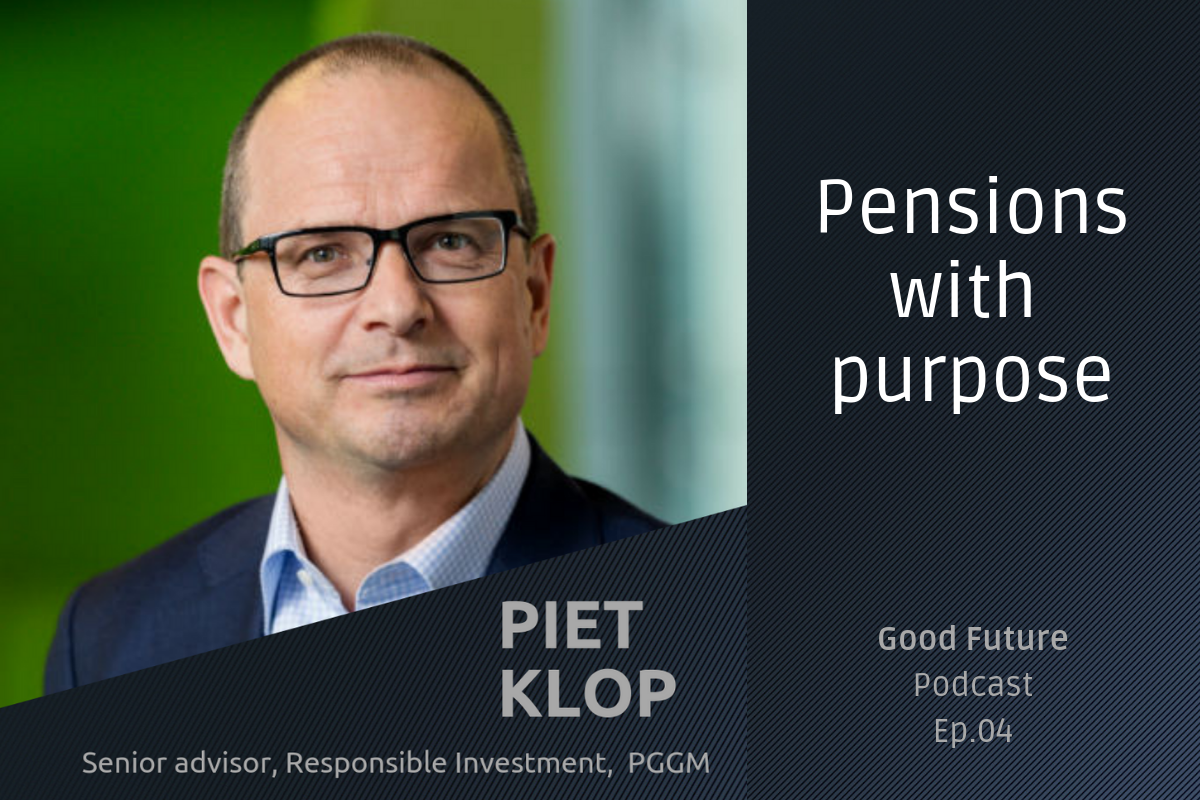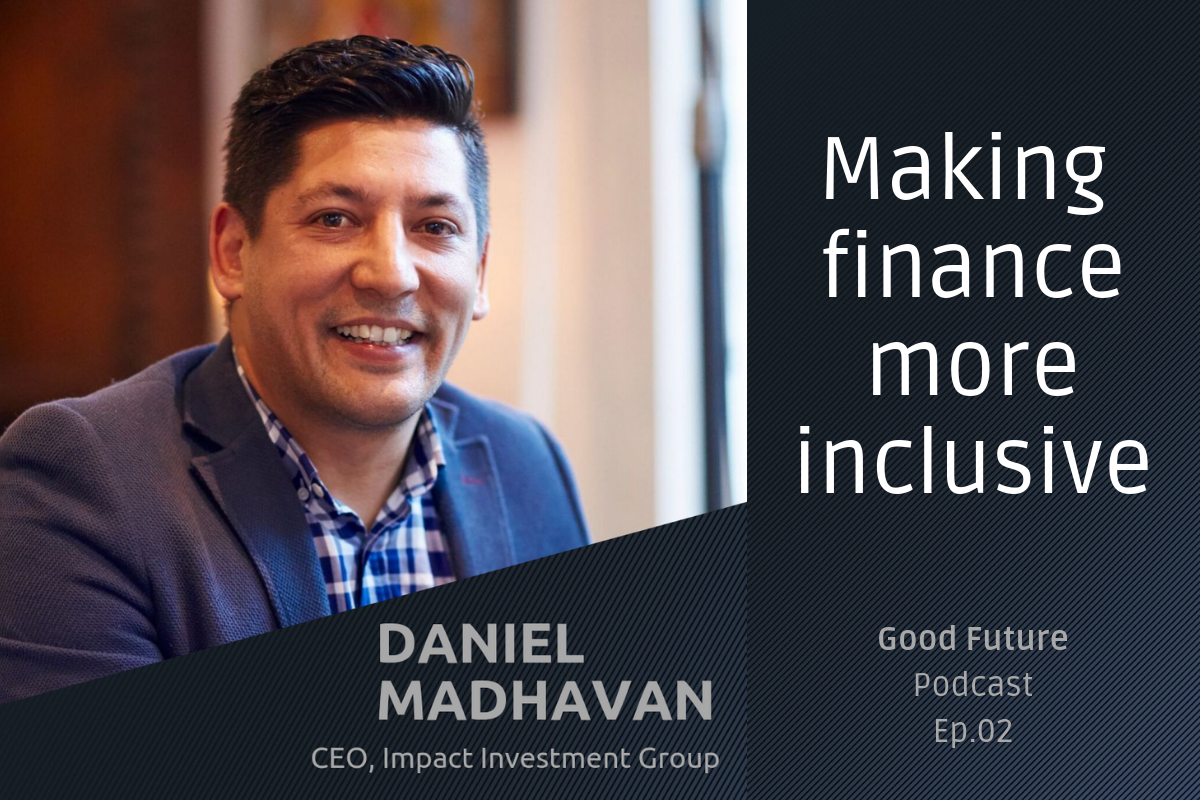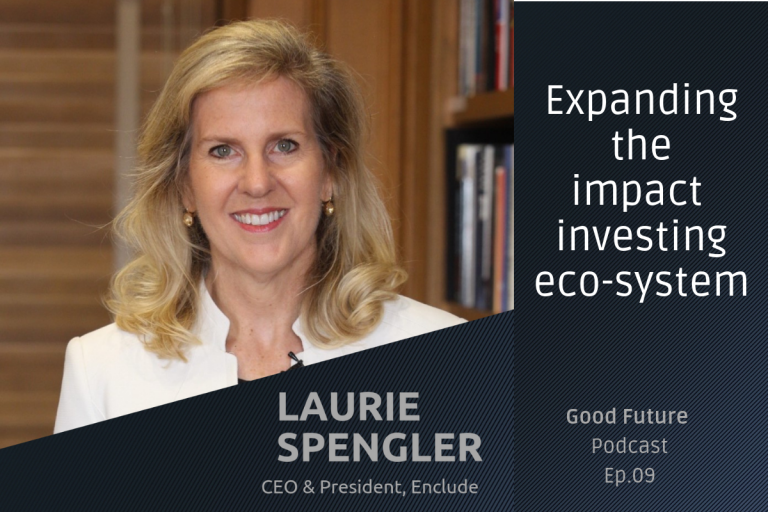Piet Klop has a remarkable ability to make pension funds interesting, and in the process he shows us the great power they have to influence change.
PGGM made a name for themselves many years ago as being leaders in sustainable investing. Long before the Sustainable Development Goals (SDG) were announced, this pension fund had identified four key challenges that they wanted to help address: climate, water, food and health.
They knew they didn’t have the same power as the direct investors (the traditional ‘impact investors’) but what they did have was scale. They were big! And when you’re big you have influence. This is what drove Piet Klop to work for such an organisation, and as Senior Advisor on Responsible Investing, he can have a big impact.
Piet Klop is guest number four on the Good Future podcast, listen here.
Responsibility is an important point here. Piet emphasised that PGGM’s primary responsibility is to their members, to pay-out their pensions, so they can have a comfortable retirement.
The difference it that PGGM does both, they earn the returns and they invest for impact.
“We can’t trade off return for impact. We want both, and we think we can have both.” Piet says.
How to have influence
“With great power comes great responsibility.” Voltaire/Spiderman’s uncle
When you have a big pile of capital to invest (PGGM manages in excess of €200 billion) people tend to listen to you. For pension funds, the trick is to wield this influence to ensure your investments are solid for the long-term. One way to do this is to ‘divest’ from companies that are making bad decisions, you can simply sell your share of a company and move on.
Divesting does two things: it sends a signal to the company, and to the market, about what you think of them (this can hit a company’s share price well beyond the fall from the original sale). It also removes that company from the pension fund’s portfolio, which will satisfy members.
In my view, this tactic is a blunt instrument. If you’re trying to bring about change, then simply ditching the company may only pass the problem on to another set of investors, who may not be as well-equipped as a big pension fund.
Instead, you could ‘engage’ with the company. An issue like climate change is a good example. In the short-term a company could ignore the risks, but pension funds have done the research. They know the threat of climate-change raises a whole range of risks: regulatory changes, extreme weather, rising sea-levels, higher insurance premiums, etc.
Through engaging with a company, you share this information, you show them the modelling, and in the process hopefully convince them to change their ways. The threat of divesting always looms large (the stick), but offering positive incentives is always a better option (the carrot).
Even Blackrock is on-board. They’re one of the biggest fund managers in the world (they have some $US6 trillion under-management) and last year CEO Larry Fink wrote a letter to his investors, and the companies they own, making it very clear that all companies have a responsibility to not only make money, but also to consider the purpose and impact they have on society. And most importantly, they’d be using their voting rights to make their views heard.
The freedom to choose
Piet explained that PGGM works hard to analyse companies, to engage with them and to choose investments that make money, while also having a positive impact. But what’s most interesting is that they do it with remarkable pragmatism.
Unlike in Australia, the Dutch pension system is a mandatory system. If you work in the health and welfare sector, PGGM is your fund manager, you don’t get a choice.
In Australia, most workers can choose their super fund. We can vote with our feet.
PGGM doesn’t have the direct feedback of members leaving to help guide them in their decisions about sustainability or social impact. From my perspective, this makes it very pure, a universal, decision-making process.
It can’t be guided by ethics or individual opinions, because not all of their members will agree. Instead, it needs to be focussed on managing risk, and improving the society its members will end up living in.
It all comes down to negative externalities
I don’t want to give away too many of the gems from my conversation with Piet, it’s better to hear it from the source. But one point I want to highlight, and spread far and wide, is the issue of negative externalities.
It’s an odd term, and it’s something every first-year economics student will be familiar with. It succinctly explains the failings of our market economy, and it’s at the heart of why we can’t seem to control things like pollution with the pricing mechanisms of supply and demand.
For Piet, this issue was one he faced in his formative years as an environmental economist. With stars in his eyes he was convinced that the problems of the world could be solved if people were only given the right incentives. The theory is sound, but in reality things are a lot different.
A negative externality is a cost to society that’s not included in the price of production.
Pollution is a good example. On a very simple level – factories don’t include the price of pollution in their products. If they did, their products would go up in price, and factory owners would compete to find cleaner forms of production.
If we all had to pay for the pollution coming out of our car’s exhaust pipes, then the economics of driving an electric car like a Tesla would be far more enticing.
Pollution is an indirect cost, and if it’s not borne by the producer, then society pays for it.
The power of pensions with purpose
Piet discussed his own views on the challenges of negative externalities, it’s a nuanced approach that is both realist and sympathetic.
But in the end he ditched his focus on incentives as tool of choice, and instead went for capital.
“Concentrated pools of capital do offer enormous opportunities for positive impact.” He says.
This is what drove him towards working with a pension fund, a role that few would find themselves aspiring to. But, if we’ve learnt anything from the conversation with Piet Klop, it’s that perhaps more people should aspire to work for pension funds.
They have big piles of capital, and increasingly, they’re using it to make a big impact.
Good Future’s Good Books
High Noon: twenty global issues and twenty years to solve them
By: Jean-Francois Rischard
“This book got me going, it was published in 2002, about twenty years ago. Well that twenty years is almost gone. It presented a case for urgency. I took it quite literally. We can’t just provide slow solutions to fast problems. This book, gave me a kick in the pants. You can’t just go small, you need to go big and quickly. I thought the book was interesting because it lays out not just the need but also the opportunity to do so. Not just the problems, but also the mechanism to solve them. You may say we haven’t really succeeded there, and a lot of stuff has happened since 2002.
Nonetheless, that is the one book I would recommend. There’s many variations on this theme, but it lays out very clearly what she be doing, why we should be doing it, and how we can succeed.”
Follow us…
Our Instagram is pretty great, check it out over HERE
My Twitter is over HERE
And you can get me on LinkedIn HERE





